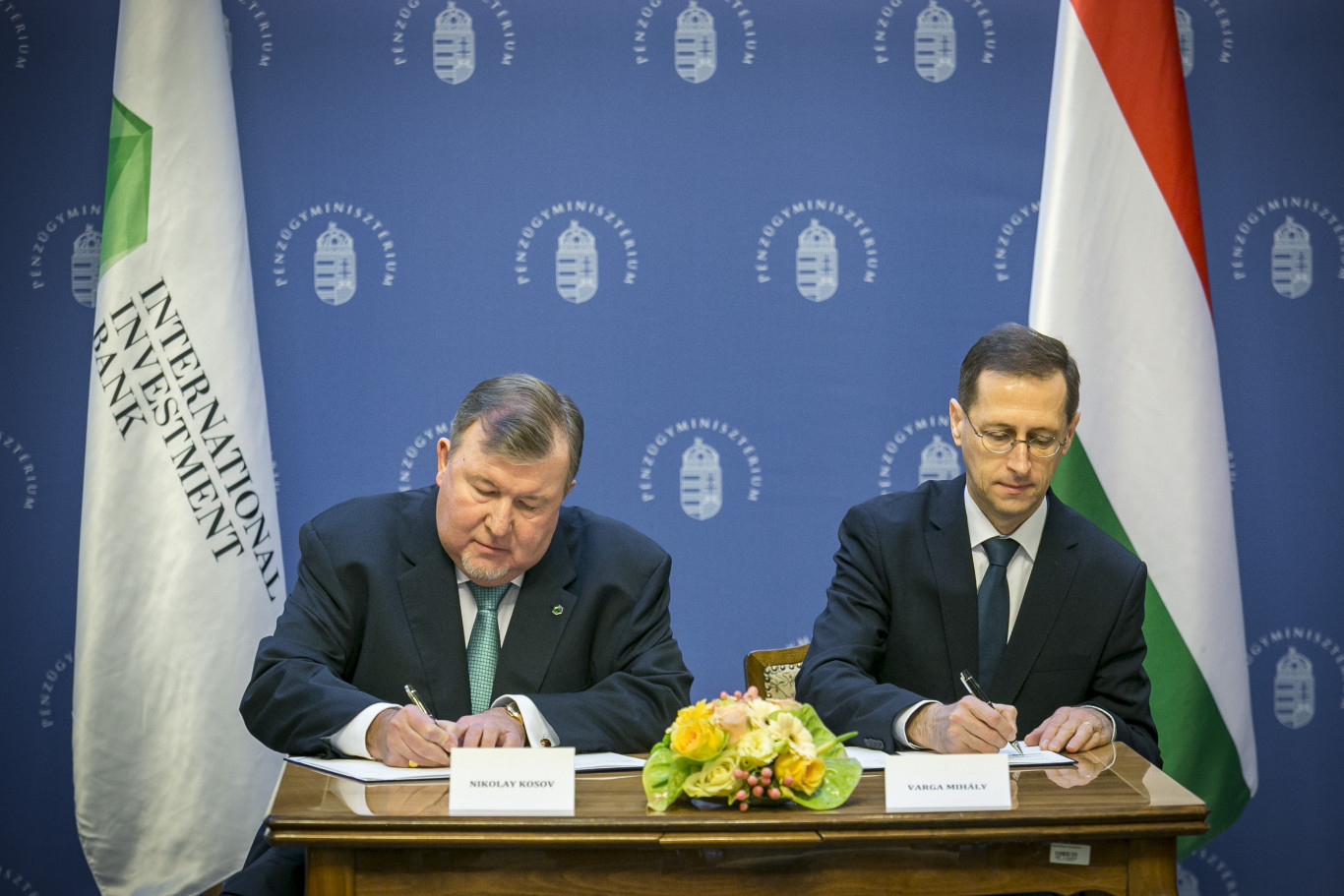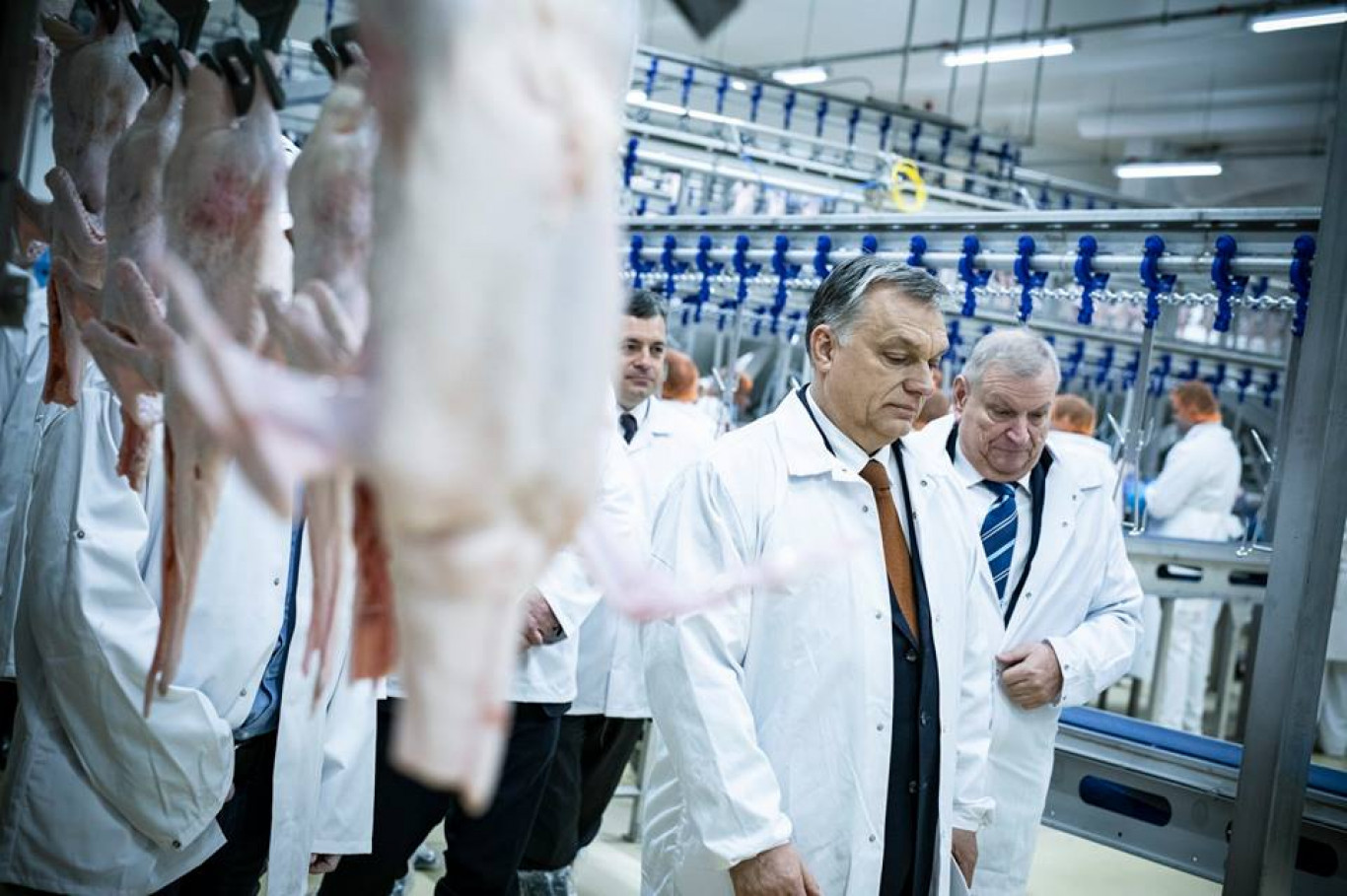Russian-led bank rapidly gearing up in Budapest amid EU and U.S. worries

It seems that nothing can stop the relocation of International Investment Bank, a former Soviet bank that was revived by Russian president Vladimir Putin a few years ago, to Budapest. It doesn’t matter that the United States is openly protesting the move, saying that this is another obvious sign of Russia’s malign influence spreading. It doesn’t matter that European diplomats are grumbling in off record conversations because of how Hungary’s government is explaining the issue to them. And it also doesn’t matter that even Hungarian secret services admit behind closed doors that they cannot state beyond a reasonable doubt that the bank does not pose a national security threat to Hungary.
In spite of the upheaval, the relocation of the IIB to Hungary is moving at a fast pace, according to new information uncovered by Direkt36:
- The bank expects to move to Budapest as soon as June.
- It has already been decided that IIB will work with a staff of about 30-40 people (which is small in the banking sector).
- They are also looking for a headquarters, possible locations include the British Embassy’s impressive former downtown building as well as a location somewhere close to Freedom Square.
- Former minister in Viktor Orban’s government Imre Boros also got involved in the management of the bank recently. Previously, allegations and documents have emerged about his ties to the Communist secret service. Boros denies these allegations.
- In addition to what has been known so far, IIB decided in early March to finance another project in Hungary, but it is not yet clear what that is.
- Hungary’s government is also negotiating to re-join the International Bank for Economic Co-operation (IBEC), which is also under Russian control. According to Russian plans, this financial institution will be merged with the IIB, which is moving to Hungary.
Meanwhile, sources following closely everything that is related to the bank, such as diplomats and banking professionals, are wondering why it is in the Hungarian government’s interest to develop such a close relationship with the Russian-led bank. IIB’s importance is rather small from an economic perspective, especially compared to Western financial institutions in which Hungary is already a member. However, with the relocation to Budapest, Russian can gain further intelligence capacity in Hungary, while also gaining insight into the operations of large Hungarian companies with strategic importance through their investments. IIB has issued a statement denying allegations of spying.
We can only do this work if we have supporters.
Become a supporting member now!
Hungary’s government is trying to fight back criticism by emphasizing that four other EU and NATO member countries are also shareholders in the bank, which together have a larger share of the bank than Russia. Although members of the bank have voting rights in multiple governing bodies of the IIB in proportion to their shares, Russia delegates the chairman in charge of operation management. Thus, according to press reports, a Russian coming from a KGB family, Nikolay Kosov, is responsible for day-to-day operations, such as investment management or staff recruitment.
Fear of Russian spying
IIB was established in 1970 and besides the Soviet Union, the institution’s shareholders were mainly Central and Eastern European communist countries. After the collapse of the Soviet Union and the dissolution of the communist bloc the bank also collapsed as several member states had left it, including Hungary.
The Russian state revived this institution in 2012 with the stated purpose that it would contribute to “Russia’s international development.” In 2014, the Orbán government announced that it would join the bank again, saying “it fits into the goals of Hungary’s economic policy, the policy of ‘opening to the East’.”
Recently, however, it turned out that Hungary, the bank’s third largest shareholder will get a special role. It was announced last autumn that IIB, of which Romania, Bulgaria, Slovakia and the Czech Republic are also members, will relocate its headquarters from Moscow to Budapest. Later it was also revealed that the bank will be granted a wide range of privileges and diplomatic immunity for its staff.
Although it is common practice for international institutions to be granted diplomatic immunity, other EU and NATO member countries are worried because of the bank’s relocation. One of the concerns that has been raised several times is that the IIB could be suitable to provide cover for Russian intelligence, especially since it was revealed that IIB chairman Nikolay Kosov’s parents were high-ranking spies of the KGB.
The United States was the most visibly upset by the arrival of IIB. „Americans are freaking out,” a diplomat from a Western EU country explained, saying that U.S. diplomacy is trying to convince others that the IIB’s move to Budapest could pose a serious security threat. Two sources informed on developments of U.S.-Hungarian relations have confirmed that the U.S. side has raised the issue of the bank at every recent high-level meeting.
The U.S. Embassy in Budapest has struck a critical tone even in public communications. They sent the following comment to Direkt36: “The relocation of the IIB headquarters from Moscow to Budapest raises concerns that Russia will use this organization to expand its malign influence in Hungary and across the region more broadly. We urge Hungary – and other NATO member countries of the IIB – to take seriously the threat posed by strategic competitors that do not share our Western values, especially a commitment to democracy and rule of law.”
When a U.S. Congressional delegation visited Hungary in March and met with Prime Minister Viktor Orbán, the Russian bank was one of the delegation’s main concerns. The only member from the Democratic side was Florida Congresswoman Debbie Wasserman Schultz, who was chairman of the Democratic National Committee during the 2016 Russian hacking and hostile intelligence operations against the Democratic Party. The U.S. delegation was led by Senator Mike Crapo, who is chairman of the U.S. Senate Committee on Banking, Housing, and Urban Affairs.
“They also received the usual official line. What more they were told was perhaps that Orbán wants to make Budapest a major financial hub and this is why he needs the IIB. But this argument makes no sense because the bank is actually tiny and insignificant,” a source with knowledge of the delegation’s talks told Direkt36. We reached out to several members of the Congressional delegation with our questions but received no answer.
EU countries have concerns too. Several diplomats representing EU member states told Direkt36 that they are not satisfied with how the Hungarian government communicates with them on this issue. “There is no way to discuss reality with Hungarian government officials. It would have been enough if they told us on background that they understand the concerns and the Hungarian counter-intelligence is keeping an eye on the bank. Because this is not just about Hungary, it is about the security of the whole NATO alliance if an institution that could be a cover for Russian intelligence is coming here,” an ambassador representing an EU country in Budapest told Direkt36.
Three high-ranking diplomats from different EU countries recalled the same specific discussion. At the end of March, the government held a background briefing with ambassadors and diplomats of Western (EU and NATO) countries where Zoltan Kovacs, Secretary of State for International Communication and Relations was answering questions. When one of the diplomats raised the issue of the IIB, Kovacs immediately and fiercely said that it is just a misunderstanding: the bank is not Russian, but international, EU and Central European countries are the majority shareholders with Russia only participating in the IIB, and this bank is just a simple economic-financial issue for Hungary.
However, the ambassador of an EU country commented this to Direkt36 by asking: “Why did Viktor Orban say during his visit to Moscow last September that he asked Vladimir Putin to relocate the bank’s headquarters to Budapest? If this is indeed an independent international institution, why do you need to ask the Russian president for this?”
Not just a single bank, but two
IIB’s biggest shareholder is Russia with 45.5 percent, they also delegated the chairman, Nikolay Kosov, of the bank’s five-man operative leadership, the management board, as well as the deputy chairperson responsible for strategic planning. Last year, IIB also announced that it could be integrated into a banking group with the International Bank for Economic Cooperation (IBEC), an institution with a very similar structure also born in the Soviet Comecon days. This merger could happen after the IIB moves to Budapest, hence IBEC can follow IIB to Hungary too, according to information by Czech weekly Respekt.
Although Hungary is not yet a member of IBEC, originally established in 1963, the re-entry process has already started. Hungarian Minister of Foreign Affairs and Trade Peter Szijjarto discussed this with the leadership of IBEC back in October 2018, and on November 20, Prime Minister Viktor Orban officially instructed his government to begin accession negotiations. On February 21, 2019, at the invitation of the bank, Minister of Finance Mihaly Varga traveled to Moscow to discuss the details of Hungary’s future accession with IBEC chairman Denis Ivanov.
According to the bank’s official website, IBEC’s authorized capital is 400 million euros – which is small by international banking standards –, and besides Russia, current member countries are Bulgaria, Vietnam, Mongolia, Poland, Romania, Slovakia and the Czech Republic. IBEC’s headquarters is in Moscow and its chairman is also Russian – Denis Ivanov’s appointment in April 2018 was initiated by the Russian government. Previously, he served as one of Kosov’s deputies at IIB, and prior to that, Ivanov „started his career at the Russian Ministry for Foreign Affairs, worked in London for a long period, where among other positions, he headed a Representative Office of Vnesheconombank in the United Kingdom.”
Neither Hungary’s Ministry of Finance and Ministry of Trade and Foreign Affairs, nor IIB reacted to our request for comment on Hungary’s IBEC membership, the integration of the two banks and on the possibility of also having an IBEC office opening in Hungary.
Business risks
Western diplomats are not the only ones who feel that they have not received reassuring answers from Hungary’s government about the IIB. The bank’s case was discussed twice in the National Security Committee of the Hungarian Parliament. Committee member and former chairman Zsolt Molnar from the opposition Socialist party said in a television interview that Hungary’s Constitutional Protection Office (counter-intelligence agency) did not identify a national security risk, but could not rule out that the bank could be suitable for covert activities.
Peter Ungar, another opposition MP from the green party LMP, who is also a member of the National Security Committee, told Direkt36 that he was trying to find out more about the IIB from the Russian side as well. A senior Russian politician told him that it is a prestige issue for them to have the headquarters of a bank that is labeled ‘international’ in the European Union, not in Russia.
According to sources familiar with the committee’s work, Hungarian counter-intelligence did not deny that the bank could be used for hostile intelligence activity.The assessment regarding IIB chairman Nikolay Kosov was that no one should be surprised that a leader of a similar institution in Russia could be close to Putin and Russian secret services. At the same time, MPs from the governing party remained silent in the committee, did not ask questions and did not request information about the bank.
However, several EU diplomats also told Direkt36 that they think it is unrealistic that the bank’s management could take part in secret service operations. “The point is not who is working at the management level, but at the lower levels. Just like the embassies: it is not the ambassador who is an undercover intelligence officer, but for example the deputy attachés and third secretaries. Bank management does not even need to know what is actually happening at the lower levels, if anything,” a senior diplomat from an EU country told Direkt36.
A former Orban government official whose job was related to economics and finance said that the real risk seems to be that IIB has signed a loan agreement with state oil company MOL and a partnership agreement with OTP, Hungary’s biggest bank, which are strategically important Hungarian companies. According to the source it is likely that, though their agreements, IIB could have accessed sensitive information about MOL and OTP. OTP bank told Direkt36 that they cannot answer our questions “without breaking bank secrecy”. MOL did not react to our inquiry.
Small bank, small money
The Hungarian government has been consistently emphasizing that it considers its participation in the bank as part of its economic policy, however, even Hungarian secret services have doubts about the economic significance of IIB. According to sources with knowledge about the work of the Parliament’s National Security Committee, even a representative of the intelligence services commented that IIB counts as an insignificant player when it comes to the size of its capital.
In international comparison, the bank is indeed a small institution – its basic capital is 329 million euros, while the capital of the European Investment Bank founded by the EU is 243 billion euros.
The bank’s Hungarian activities also seem relatively insignificant considering the allocated amounts. IIB told Direkt36 that so far it has invested 96.5 million euros in Hungary and is considering further investments into agricultural, energy, and SME projects in the amount of 100 million euros. Last August, its Hungarian loan portfolio was 71.5 million euros, and at that time it was considering further investments in the amount of 60 million euros.
This size is “peanuts, doesn’t count” according to a former economic official of the Orban government. Comparatively, the Hungarian banking system’s loans amount toseveral billion euros annually. According to the source, the size of IIB’s loans in Hungary are comparable to that of a smaller Hungarian bank.
The Hungarian government has relatively few IBB financed projects to highlight. Following our request for public information, the Hungarian Ministry of Foreign Affairs and Trade mentioned only one IIB investment approved by the government.Itis a35 million euros waterfowl processing company in Melykut, Bacs-Kiskun county. Prime Minister Viktor Orban attended its January opening ceremony.
Despite the small economic significance, Hungary’s government threw its weight behind the bank. Hungary is represented at the highest level by Mihaly Varga, Minister of Finance. But another Hungarian person can also be found amongthe bank’s leadership. This person is Imre Boros, former Minister in charge of PHARE (European development funds granted to Central and Eastern European countries since 1989) in the first Orban government (1998-2002), who is a member of the bank’s board of directors. His role in IIB, which is facing accusations of Russian espionage, is interesting because there were allegations that Boros also has had links to secret services.
Between 1970 and 1988, Imre Boros was head of department in the Hungarian National Bank and later deputy CEO of the Hungarian Investment Bank. He later made a political career in Hungarian right-wing parties. In 2002, he quit from one of these parties’ parliamentary group after former Hungarian daily Nepszabadsag reported, citing documents of the Ministry of Interior, that he had been an operative agent of the Communist state security police under the code name D-8. According to the documents, he was recruited just before the regime change in 1989.
Back then, Boros admitted in an interview with MTI (Hungary’s state news agency) that he was in contact with secret services, however, he said this was because they were investigating a crime related to the Hungarian National Bank. News media in those days reported that Boros held the rank of captain of the state security police and received payment for his service. However, Boros told Direkt36 that several authorities (including the Ministry of Interior and the tax office) have since confirmed that he had no such income. He also added that his participation consisted of the following: “In a case connected to the Hungarian National Bank I was obliged to cooperate on the side of Hungarian prosecutors and police. This case was obviously not a secret service matter, but a regular dispute of economic nature.”
Boros refused to tell Direkt36 when he joined IIB and who appointed him tothe position. The former minister only said that this happened “recently”, and his nomination came from “those who should do this.” He added that having spent a quarter century in the banking sector coupled with his international financial experience makes him suitable for this position. He also said that he speaks four languages, including Russian and English.
Reacting to the criticism surrounding the bank he noted that “one can be grumpy towards the Russians but this would be silly,” since Hungary does have trade relations with Russia. And IIB is moving to Budapest because it can have better access to international financial markets from the EU territory, he added. He called it ridiculous that the bank would be coming here for reasons of espionage. “The Russians would need to be very desperate to use this bank for espionage,” Boros said.
The former minister will soon be able to meet and greet his new colleagues in Budapest since IIB can move to Hungary as early as June. The bank told Direkt36 that it would try to acquire an official European address by the end of April and “it is estimated that the move will happen in June, subject to finalization of all required procedures.”
We can only do this work if we have supporters.
Become a supporting member now!
According to the diplomatic sources following these events, IIB will start its Budapest operations with a relatively small, 30-40 personnel and is looking for a location matching its needs. According to the knowledge of two Western diplomats who spoke on condition of anonymity, the bank is considering two options. One is the former building of the British Embassy which they used for seventy years until 2017. The impressive building in Harmincad Street, Budapest is also known as the former Inland Bank headquarters. The other possible location is in the area of Liberty Square which is home to several major organizations already. These organizations includethe U.S. Embassy, the Hungarian National Bank, and Rosatom, the Russian state company, which is working on building Hungary’s new nuclear plant.
When asked about the location, Imre Boros only commented that he had several options in mind, and that it was “part of the consideration is that it should be in a prestigious location while also fulfilling the requirements of modern office technology”.




